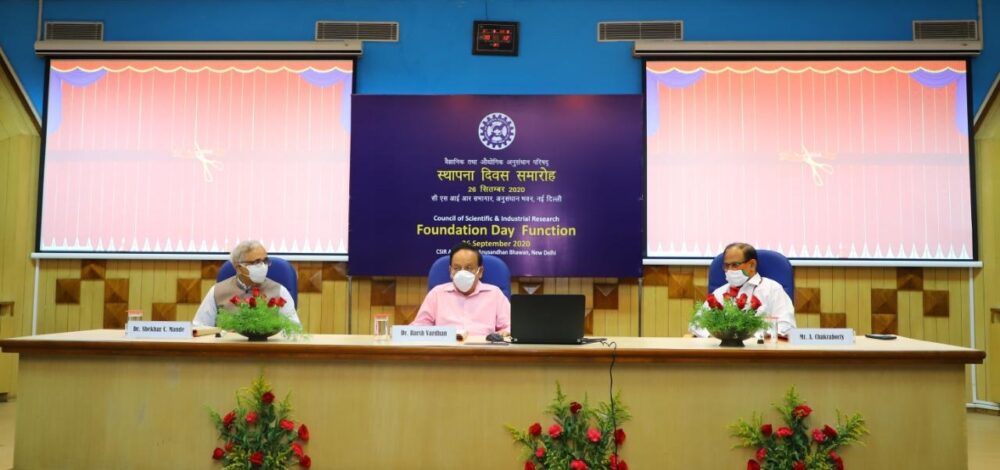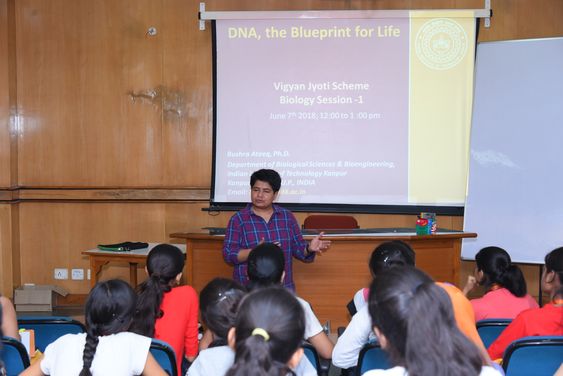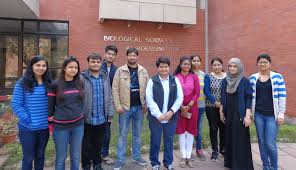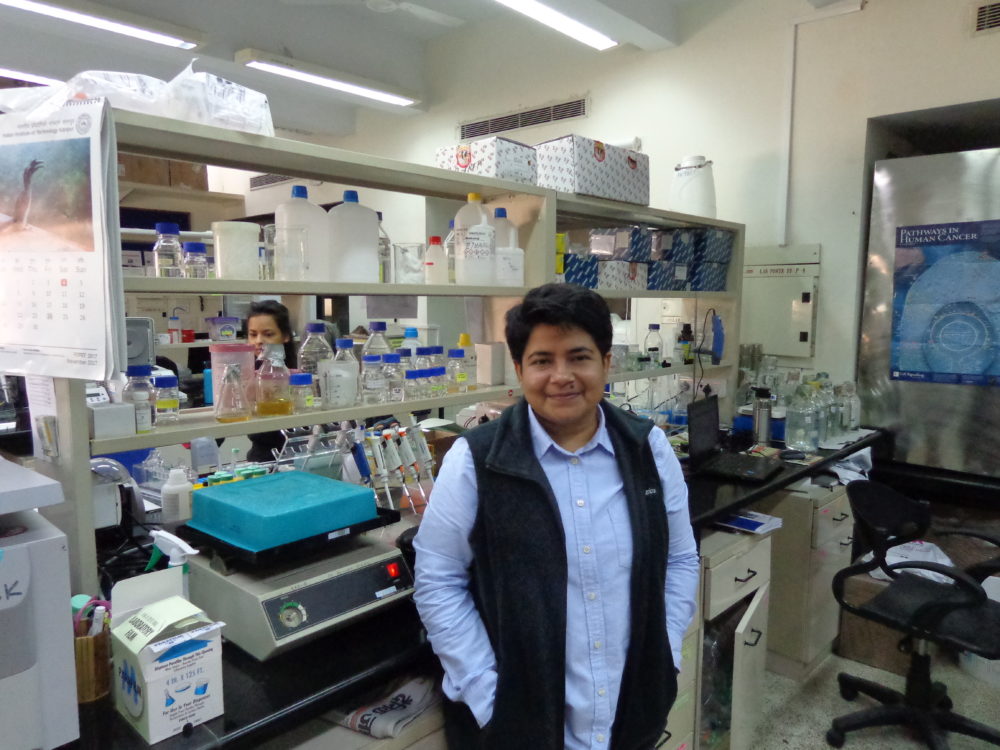India’s highest science award, the Shanti Swaroop Bhatnagar award, 2020, announced on 26 September during the foundation day of the (CSIR), had 12 awardees, of which three were women, including the AMU alumnus Bushra Ateeq.
Dr. Bushra Ateeq who has won the prize in the Medical Science category, is currently an assistant professor at the department of biological sciences & bioengineering, IIT-Kanpur and has completed her PhD from Aligarh Muslim University.
She has won accolades for her leading role in the research of understanding the complex molecular events involved in prostate and breast cancer progression, identifying early diagnostic markers, and valuable therapeutic targets.
The Shanti Swaroop Bhatnagar prize, held in high esteem across the country, is given each year to Indian scientists below the age of 45 for outstanding research in seven fields—Biology, Chemistry, Environment Science, Engineering, Mathematics, Medicine and Physics. The award is named after the founder Director of the Council of Scientific & Industrial Research (CSIR) India, the late Dr Shanti Swarup Bhatnagar.

Considering the 52-year history of this award, where, only 14 women have won this coveted prize, so far. This year’s list clearly indicates that women are finally making their mark in the hitherto-male-dominated field.
Cheering for Bushra Ateeq, the Alig Fraternity said that it is proud of her achievement and wishes her all the best for her future endeavours. Dr. Ateeq has been congratulated by several individuals and groups.
IT Kanpur director, Prof Abhay Karandikar congratulated Dr Bushra. “It gives great pleasure to IIT-K that Dr Bushra Ateeq has been chosen for the prestigious Shanti Swarup Bhatnagar Prize for Science & Technology 2020 in the category of Medical Sciences. You have made us proud, said Karandikar.
Thanks Prof. Karandikar @karandi65 for your kind wishes and appreciation. I am truly honoured to receive this recognition for our work 🙏🏼
Kudos to my group members and students for their hardwork, dedication and commitment 👏🏼👏🏼👏🏼 Thanks everyone !!! https://t.co/Zk8QFLHJ0t— Bushra Ateeq (@bushraiitk) September 27, 2020
Dr. Bushra said, she feels humbled and honoured. “I think I am just a scientist,” stated Bushra, expressing her distaste for the label ‘woman scientist’.
Bushra also praises IIT Kanpur’s unconventionally non-bureaucratic environment for giving her the freedom to conduct research and forge collaborations without any interferences. This, she believes, is most important for a scientist. “It’s the best place to be in India,” she said. “The environment is very friendly. I can walk to the dean’s office with a problem, and they will try their best to resolve the issue. I can approach even the director and they are always ready to help.” “I am extremely thankful to the IIT Kanpur, she added.
Dr. Bushra Ateeq had also been chosen for the CNR Rao faculty award 2018 for her work in establishing the role of specific microRNAs in regulating the levels of SPINK1, a protein found in elevated levels in prostate cancer patients.
Spotlighting the journey of Bushra Ateeq in Medical Science

Recalling how her interest in cancer biology was developed, she told to firstpost, how upon seeing the chromosomal aberrations that occur in catfish after exposure to chemicals commonly used in farmlands got her thinking. Could there be similarly disastrous effects of these herbicides on humans as well? She wanted to look at the effects of these chemicals on people using them in agriculture. And, looking at chromosomal breakages, the one disease that comes in your mind is cancer, she said. So, upon finishing her PhD, Bushra began closely working with cancer.
Cancer biology was not always on the cards for Bushra during her research education because her PhD thesis leaned more towards environmental genetics.
After growing up in Bareilly, UP, and getting her early education, and then a PhD, from Aligarh Muslim University.
She did her post-doctoral research in AIIMS and the National Institute of Immunology (NII) in New Delhi and followed it up with doctoral training from McGill University, Canada, and the University of Michigan, US, to train herself in advanced techniques in cancer research.
Equipped with the knowledge and expertise, Bushra returned to India in 2013 as an Intermediate Fellow, Wellcome Trust-DBT India Alliance, and joined IIT-Kanpur’s department of biological sciences & bioengineering as an assistant professor and set-up her own lab at IIT Kanpur.
Bushra unveils that in her Masters and PhD days, she had to go to other departments to use their inverted fluorescent microscopes. But now her lab has one of its own fluorescent microscopes and is occupied with many high-tech, clean and gleaming equipment.
Bushra Ateeq’s Research Work
According to Life of Science, the focus of much of Bushra’s research work, is the cancer of the prostate gland, a walnut-sized and spherical gland located below the urinary bladder in men. Its function is to secrete seminal fluids, the healthy medium through which sperm is transported. The cancer cells Bushra performs her experiments on, are from American Type Cell Culture Collection — a cell culture repository and supplier of standardized quality cancer cells.

In addition, Bushra also identified the patterns of gene alterations that occur in the Indian population. For this, she associated with hospitals and medical centres, namely Ganesh Shankar Vidyarthi Memorial Medical College (GSVM) in Kanpur, King George’s Medical University in Lucknow and All India Institutes of Medical Sciences (AIIMS) in New Delhi. These hospitals provided her with samples of human cancer tissues that came from biopsies and surgeries conducted on patients suffering from breast and prostate cancers.
The method that is currently used to conduct a biopsy of the prostate gland involves making up to 12 punctures in the prostate gland using thick needles. This is how tissue samples are extracted for testing. “Watching a biopsy take place is so painful, it makes you feel you should come up with some alternative system of maybe a blood-based or urine-based diagnosis. I personally feel urine-based diagnosis is better as it is totally non-invasive, and being the cancer of the prostate gland makes it easier to get a biomarker in the urine,” she explains.
In a first-of-its-kind attempt in the Indian sub-continent, Bushra and her team have tested nearly 121 prostate cancer tissue samples and identified several significant genetic alterations. These discoveries have the potential to be translated into effective therapies and treatments. “This is one of the first such discovery from India. It is like a rough check of the prostate cancer cohort in India,” Bushra said.
The findings of the study provide insights into treating other types of cancers too. “The major findings of the study will not only advance the prostate cancer field but will also be valuable for treatment and disease management of other malignancies like colorectal, breast and pancreatic cancers that show increased expression of SPINK1,” concludes Prof Ateeq.
The number of prostate cancer cases in India is escalating. Currently, nine in 1,00,000 men are affected, and it is the second-most common form of cancer after oral cancer to affect men in India. The Indian National Cancer Registry in its report predicts the number of prostate cancer patients to double by 2020. Bushra attributes this to the increase in life expectancy of humans today — which is around 76 years for men. With age, the chances of prostate cancer rise. “It’s more of an old age cancer.”
Challenges faced by Bushra Ateeq in Research
In her five years of doing cancer research in India, Bushra has identified two problems with the Indian scientific landscape — one structural, and the other cultural. “In India, we are largely dependent on our PhD students who, by the time they are scientifically mature and productive, will graduate and move to the US for their postdoctoral training,” says Bushra.
Bushra avers that India needs to attract the best scientists — and not just those of Indian origin. “Government should have schemes to attract foreign researchers as well.”
The cultural challenge is dealing with the quintessentially Indian passive mindset of chalta hai. “What I do not like is that there is no respect for time and commitment,” Bushra rues.
However, many difficulties faced by Bushra during research, was in sourcing human cancer tissues from local hospitals and clinics. This involved getting ethical clearances, and sometimes the process for this was tedious for her. As per protocol, patients had to sign consent forms informing them of why, how and where their tissue samples would be used. Applications for ethical clearances, hence, tend to involve large amounts of paperwork and often result in dead-ends. “My students ended up waiting for hours outside a hospital’s operation theatre to get tissue samples from surgeries and biopsies,” Bushra lamented. According to her, this problematic system is why she has not been successful in procuring cancer tissue samples representing a wider geographical area.

Upon being asked, once, about the gender-identity challenge, she denied any instance either at home or at work, where she felt disadvantaged as a woman. For this, she credited the liberal upbringing, she received from her parents and the support of her friends and colleagues. However, she points out an unpleasant incident that occurred during her days as a graduate student at Aligarh Muslim University (AMU). During a conversation about career plans post-PhD, a male friend and colleague suggested, to Bushra’s surprise, that she would be better suited to take up a teaching position at a local undergraduate girls’ college, whereas he was a more suitable candidate for a research position at the university. “The mindset was such that the university set-up is more research-oriented and therefore more suitable for men, whereas it is more appropriate for a woman to go to a women’s college and do the undergraduate teaching.” Obviously, Bushra paid no notice to this. She advises young girls and women to remain focused on their goals, remain persistent and not let criticism get in the way of success.
Bushra Ateeq is now the source of inspiration for future scientists those who can follow the level of dedication, hard work, and commitment for original research can achieve the same.



